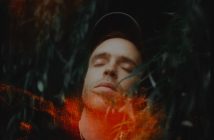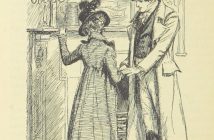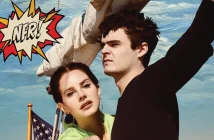Pitch Perfect 2, the long-awaited sequel to the a cappella smash hit of 2012 hits cinemas today. The Edge caught up with Elizabeth Banks, who directed and stars in the latest instalment of the franchise, to chat about stepping into the director’s chair for the first time, and making such a hugely anticipated sequel. Here’s what she had to say:
On making films about college students…
I think, first of all, it is a transitional age. It really is a coming of age time in everyone’s life: I think when you’re younger than twenty, you’re aspiring to be 20, you just can’t wait to be 20, and when you’re my age you go, ‘oh, it was so nice when I was 20’. You have a lot of nostalgia for that time in your life because you really do realise, when you get to be my age, how much that time period shapes who you become as a person.
On acting and directing simultaneously…
I like directing myself. It’s very interesting, it’s like I know what I want – I don’t even have to say it out loud, it’s so easy to direct me, and I have a great partner in John [Michael Higgins], he and I are old friends, and he is so good at his job. We just toss each other softballs, and try and make the crew laugh. It’s technically not difficult, I set the shots up with a double and they light it while I do my hair and make-up. I put three cameras on it so we can get it done really quickly, and I really trust my [Director of Photography] and I have a monitor the whole time so I can see what’s happening, what it looks like. So it’s technically not hard – people think it’s somehow really hard, but it’s technically not at all.
On female body image in Pitch Perfect…
One of the things I love about our films is that no-one apologises for themselves: no one talks about what they look like, there’s no makeover sequence, nobody’s talking about the clothes they’re wearing, you know, they’re just living their life. It’s not about boyfriends; it’s just about regular, real girls of all shapes and sizes and ethnicities, and just a wonderful chemistry between all of them.
On telling a story of female friendship…
It was a natural progression from the first film. The first movie is about putting the band together, so we didn’t really know who any of them were, we just knew they were sort of a group of misfits who all had one thing in common: they really loved to sing. And this time around, I used my experience as a sorority girl at university to inform this notion of all the women living together in a house, and really having that bond. And also [about]facing graduation and how friendships sustain you through that transition in your life.
On what she’s kept with her from her university days…
It’s innumerable – I found my husband at college, he’s still around.
On feminism and the female-lead cast…
You know, what we have done is very rare. And so it’s perceived as being this sort of this politically feminist statement. And I am a feminist: I am not afraid of that word, I love it. I’ve spent a lot of my time fighting for women, and also trying to lead by example. And also, the main thing I’ll say about this movie was that we just wanted to make a really funny comedy, that happened to be about this all-girl group – I mean, it was based on a book that was about the first all-female group, Divisi at the University of Oregon, who won the national title in America. So, we started there; we weren’t like, ‘Let’s make a movie that’s feminist! It’s about girl power!’ That was not particularly an intention of ours, but because we made a movie about a group of women, and nobody else makes those movies – we are a feminist statement, just by our existence.
On getting the cast to focus on set…
I have a very professional team of people, my entire cast included. Everyone was very game, really up for it – we shot the sequence of the camp the first week of filming, the very first sequence that we shot, and it was all about getting people to get up on the zip-line. Everyone was overcoming their fears with each other and cheering each other on, it was really amazing. The logistics of the movie were insane, – it’s a very big movie, with a lot going on, but wrangling the actual people was not particularly a big concern of mine. I wanted there to be room for everyone to play; I have a lot of wide shots in the movie where you see everybody all at once, they’re all just kind of mashed up against each other, and that’s the energy that I wanted in the movie.
On the open sexualities seen in the film’s characters…
I’ll just say this. You know, college is a liberal time. You’re supposed to experiment. It’s how you figure out who you are. I think it is funny by its nature – but the reason it’s funny is because everybody relates.
On the international reputation of America…
One of the things that the world likes America to do is make movies. We’re really good at making movies. No, that [line]was really meant to be funny, we had a bunch of different lines there and we ended up choosing that one because it was the one that made the most people laugh. I think even in America we just assume everybody hates us because we’re just so good at everything, it’s like, well, of course they want to take us down a peg.
On getting to direct the movie…
Well, I produced the first movie, that helps. And I worked really closely on that movie with the director, Jason Moore, I hired [him] to make that movie. Really what happened was that I was actively looking for a movie to direct, and really the stars to have to align, I think, in life – and I was really just at the exact right place in my experience to take over the reigns of the movie: I had worked so closely on the first film; the studio knew they could trust me to do it; I had been directing shorts and little things as time allowed in my very busy acting career in preparation for directing a feature – and then Jason fell off and I was just like, of course I should do it.
On approaching the sequel…
It was really all about expanding the world. The first film is a pretty small story, it’s university-set, it’s about two groups from the same school, we never had to leave the campus, and it’s also told really from Beca’s point of view – and [with]this film, we really felt like we could expand the world of a cappella, we could get off campus. It’s a theme of the movie: the girls leaving the nest and meeting more adults, and so the riff-off this time is not just between the collegiate groups – it’s like big professional groups and real grown ups. That notion appealed to me, of putting them in contact with the grown ups. They’re the big fish in their little pond: I wanted to show a really big pond. And then all the musical numbers: I think its important to remember that in the first movie the Barden Bellas pretty much sang ‘The Sign’ like, four times in a row, you literally heard them sing the same thing over and over again, and it wasn’t until the finale of the movie – maybe the pool mash-up – but like the last two sequences in the first film [are]the only time you ever saw the Barden Bellas really be explosively amazing. And in this movie, they are amazing from the first minute – and so every sequence this time round had to just be totally blown out: bigger, better, crazier, camera angles, light-show, fire, the whole thing.
On the popularity of a cappella…
I think a cappella’s an interesting metaphor for life. It requires all the voices to sing in harmony to be at its best and I think it’s a very important message that Beca learns, which is that we don’t get through life on our own. You have to rely on people. We need each other, and a cappella is all [about that], I mean you can’t do it on your own, you literally can’t do it by yourself, I mean you’d be singing a melody line, [but]who cares?
On tips from other directors…
I got some specific advice, like Francis Lawrence told me to include the hips when shooting the dance sequences. Turns out that this [indicates waist up]is not very interesting, but if you add the hips, it’s very interesting. So that was very good advice; he had a long career making music videos, so some of it was as specific as that… and some of it was just style. Judd Apatow allows for tonnes of [improvisation]on his sets which requires cross coverage, which is a pretty technical term – but cross coverage is not something that everybody does, it’s not something every director of photography likes to do, and so it was really important to me that we were able to improv on our set and capture both sides of the conversation at the same time – so you have to cross cover and you know that’s something that I essentially stole from Judd.
On getting into the film industry…
Do [you]want to live in LA or New York? That’s my first piece of advice, you’d be surprised how many people are like, ‘I wanna get in the movie business,’ and I say, ‘Where do you live?’ ‘I live in my hometown.’ Well, move to New York or LA, ’cause that’s where the movie business is. You have to at least be courageous enough to go there.
On the real world of a cappella…
All of it is based in some version of reality. We have a lot of authenticity checks along the way. Kelley Jakle who plays the blonde, Jessica, she was in SoCal VoCal at the University of Southern California – they actually just won the championship in America. They’re a co-ed group though, not all female. She literally just graduated from this group so she gave us a tonne of real-life stories. Like, they do all live in a house together, they do all tour together, singing the National Anthem at the Puppy Bowl – that’s totally a real thing. Pentatonix sang at the Audi car show – you can watch it on YouTube – it looks exactly like what we did. One of the reasons that the Germans were chosen as the arch-nemesis this time around was because when we looked at the world, and where a cappella is most popular – it’s most popular in America and Germany, so it just made sense.
On choosing her projects…
I don’t want to be bored, that’s important as you get older. I just look for stories that interest me, characters that interest me, journeys that interest me. I don’t have an overwhelming desire to challenge myself [laughs], but I do find that it also depends on where I’m at in my life, and what interests me. It changes. Your goals change.
On extracurriculars at university…
Of course, I was in a bunch of theatre groups, and I sang in musical theatre and did plays constantly. Pretty much all through college I was performing.
On advice for dealing with stress…
Drink a lot of water. Don’t eat salt, avoid salts. Sleep – it’s more important than you realise. And don’t party until you’re done with the very last test. That’s a guide to life really.
On pressure to make the sequel a success…
My number one goal was not to disappoint the fans of the first movie, and whenever you make a comedy sequel it’s sort of a referendum on the first film. That movie’s beloved to me as well, I’m very proud of it – it absolutely came from my heart and soul. So I also wanted to protect the legacy of that movie.
On a potential third Pitch Perfect movie…
It’s possible. We need to put this movie out and see. I would say that we really strove to do something organic and authentic with this story. You want to give the audience a little more of what they love, but not totally repeat yourself. You want to grow. I don’t really know what the journey would be in the next one. We don’t have any plans yet.
On the declining popularity of musicals…
I don’t know if that’s true – Wicked sells more tickets, I think, than anything in the world. But I think it’s very risky to make an original musical – they do it in animated films like Frozen all the time and we were able to make this movie frankly because we didn’t have any original music – we were using songs that people already know. People are a little scared of original musicals. I mean, I’m not scared, but the people that write the cheques are scared.
Pitch Perfect 2 (2015) is released in the UK on 15th May by Universal Pictures, Certificate 12A.



